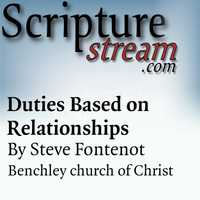-
I Peter 5:2 – Shepherd which flock? The one among you, that you sustain a relationship with.
-
Matthew 28:18-20; Ephesians 1:22-23 – Elders have oversight, but they are never to take the place of Christ, the head of the church (in the universal sense). Elders are not lawgivers – Jesus is.
-
Ephesians 6:4 – This verse is a good example of how duties are based on relationships. Not all people who read this letter can apply this verse – only those who are fathers. Furthermore, the fathers’ authority is circumscribed by the relationship. A father is not responsible for disciplining and teaching children that are not his own.
- A father that is also a coach may discipline other children in his role as a coach, but only in matters pertaining to that role.
-
Acts 14:23 – Elders (plural!) were appointed in every church.
-
Acts 20:28 – Elders had oversight over a single flock. See also I Peter 5:2. Today it is common to have a sponsoring church arrangement, which puts elders in control to some degree of the affairs of another flock.
-
The authority of elders begins and ends with the local church relationship.
-
-
Acts 11:27-30; Philippians 1:5; 4:15-16
-
Very little is said about elders controlling funds in the church. Their primary concern is souls.
-
In Acts 11, money was sent to the elders so they could distribute it among their flock.
-
If elders could assume control of part of another church’s work (like the money), what would prevent them from assuming control over other things (like who the preacher is)? What would prevent them from controlling multiple churches? This is how Roman Catholicism started.
-
-
II Timothy 1:13 – Hold to the pattern!
SF
October 13, 2020
For further study, see also:
Questions or comments? Join our Discord server for further study.
